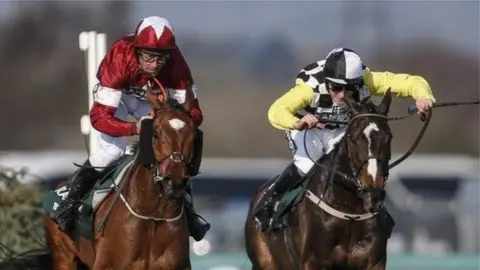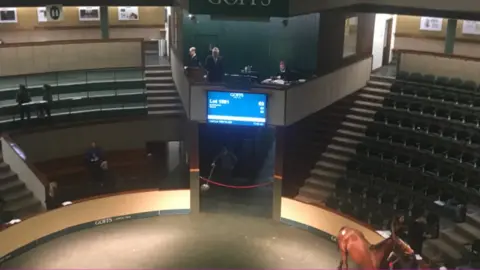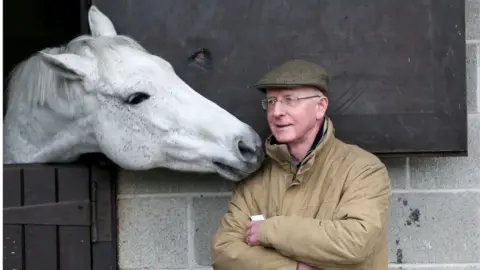Brexit: Ireland's horse racing industry fears impact
 BBC
BBCAt Ireland's biggest bloodstock sales firm, the relentless pace of the auctioneers' patter resembles a commentary on a steeplechase.
Would-be buyers from dozens of countries come to Goffs in County Kildare to bid on the thoroughbred horses which parade around the main arena.
Chief executive Henry Beeby regularly takes the hammer to preside over the spectacle.
He's conscious of one particular hurdle which the equestrian industry is hoping to clear - the UK's departure from the European Union.
Biggest breeder
"British and Irish racing is really one industry," he says.
"Britain doesn't produce enough foals to be able to serve its own fixture list - it needs imports.
"Ireland is the biggest breeder in Europe.
"So it is absolutely imperative that there is no restriction of freedom of movement, for people or horses, and that there are no tariffs."
He sees the Brexit issues from both a British and an Irish perspective, as Goffs has a subsidiary company based in Doncaster.
Over its 152-year history, the firm has sold many horses which have gone on to win the biggest prizes in racing - including Arkle, Red Rum and L'Escargot.

Mr Beeby explains there is currently a tripartite agreement between the UK, Ireland and France, which allows horses to move between the countries with ease.
"If that were not to be replaced, it would cause big problems," he says.
"The authorities have been working on what's called a high-health status.
"That means all countries will hit certain standards and they would be able to agree that they would have free movement."
But he cautions: "That will need political agreement."
The concerns of those who auction horses are echoed by those who breed them.
'Highly-strung animals'
Shane O'Dwyer leads the Irish Thoroughbred Breeders' Association, which has about 6,000 members.
He says the tripartite agreement enables the movement of horses to be a "painless" process.
He warns about the impact of any change in that, such as delays in transport due to increased health checks.
"Think about highly-strung animals in a queue waiting for border checks - obviously that would be very difficult," he says.
"The industry in Ireland is worth about €1bn - we want to protect that."
At race meetings, Brexit is also a big topic of conversation.
Dundalk Stadium in County Louth is just a few miles from the border with Northern Ireland.
The bookies accept bets in sterling or euro.
 Getty Images
Getty ImagesBut few at the racecourse are making predictions about the outcome of Brexit.
Leading trainer John Oxx says: "There's likely to be no particularly good outcome for us - other than if Britain stays in the customs union. Things like that would make a big difference."
His main concerns are the potential for "adverse effects" on the economy, which would impact on the trade of horses - and the possibility of more border checks.
Another trainer Pat Martin can remember taking horses across the Irish border when there were checkpoints.
"You just had to take extra time to plan," he says.
"Now it takes an hour and a half to get to Belfast - back then it could have taken you three hours.
"Hopefully that never comes back."
'Enemy of all markets.'
There's probably no sport more internationally associated with Ireland than the "Sport of Kings".
Henry Beeby from Goffs describes it as "almost the national industry".
His firm is the second biggest of its kind in Europe - last year it sold about 5,000 horses for a total of about €175m (£155m).
He says he would like clarity around Brexit more than anything else because "uncertainty is the enemy of all markets."
And Mr Beeby says he's "enormously frustrated" with the political arguing.
"Politicians have always told us to come to them not with problems but with solutions," he says.
"I think as an industry - in Britain, Ireland and France - we can go to the politicians with solutions.
"But they have to be willing to listen to them."